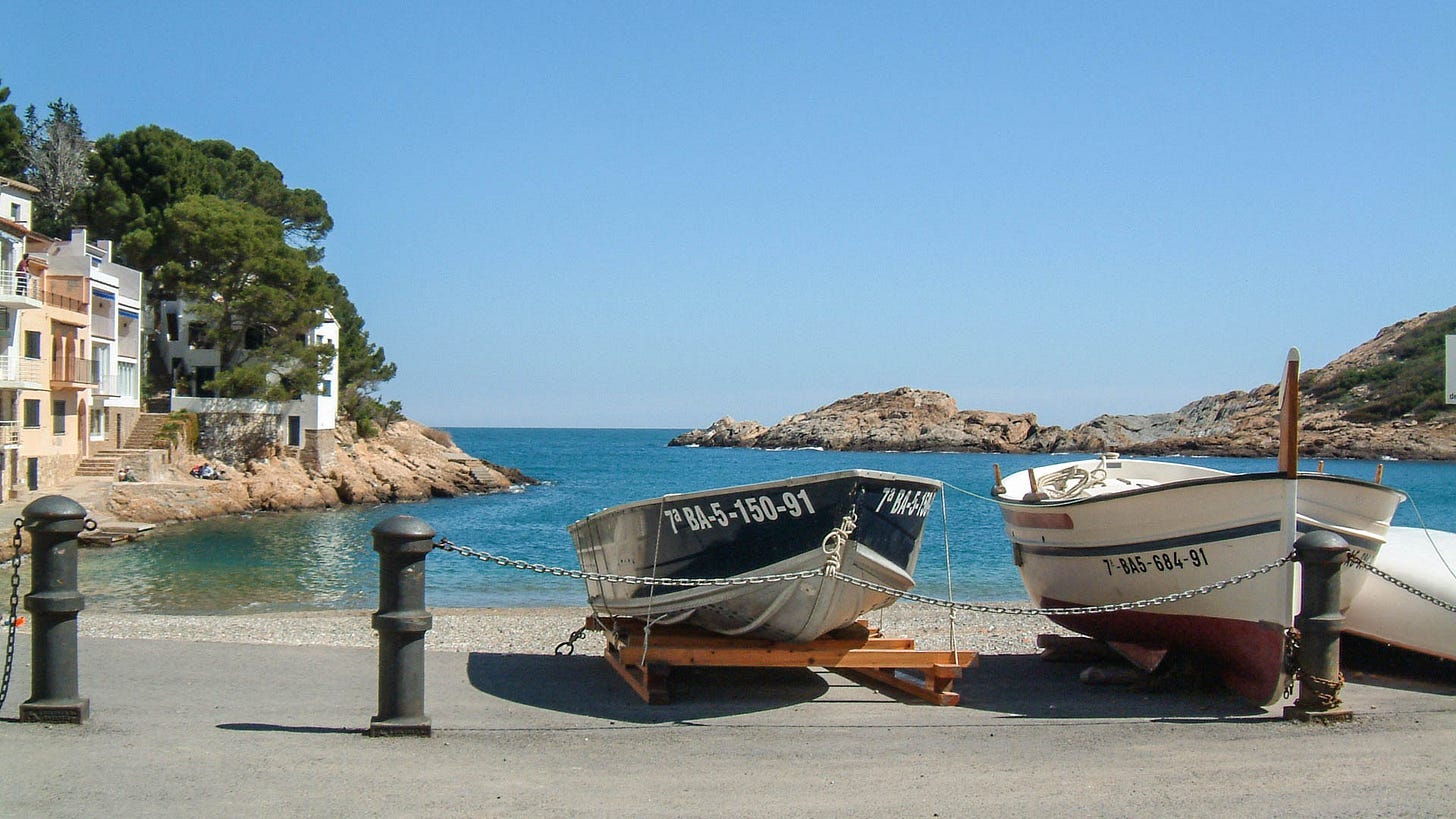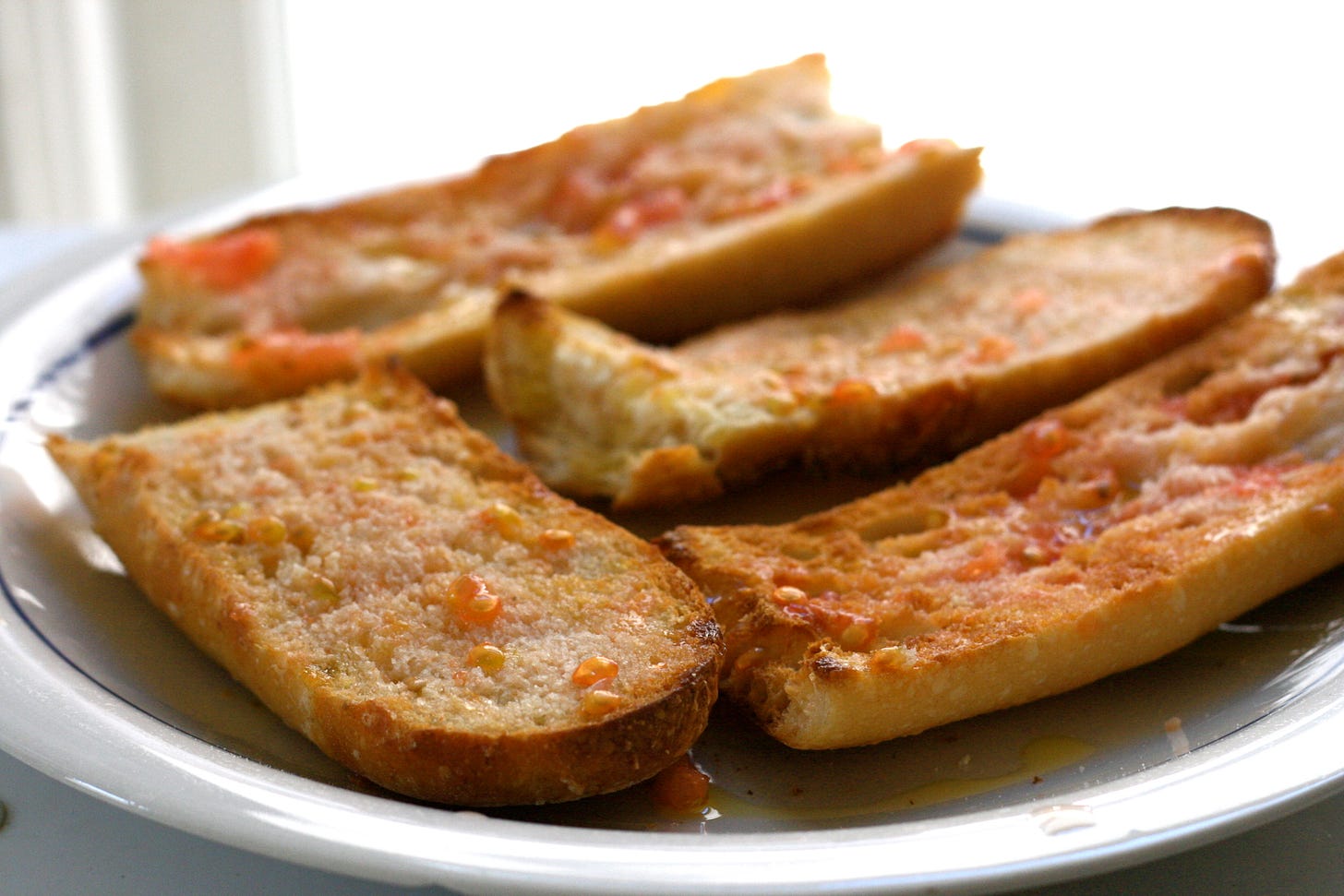A couple of nights ago we were sitting on the sofa watching the final moments of FC Barcelona demolishing RCD Mallorca when, a propos of nothing at all, Stuart turned to me and asked: “What does the Es in Es Secret mean?” This question was so left field and so out of context that it took some considerable time for the penny to drop. God knows what convoluted rabbit holes his mind had been wandering down in those final minutes of the match, but he was referring to the newish brewery in Palafrugell where we had supped an IPA or three during the summer.
Given that és is the third-person singular of the verb ‘to be’, the temptation is to assume it means “It’s a Secret”, or “It’s Secret”. But what it actually means is the, as in The Secret, in the unique Empordà dialect known as parlar salat. Speaking salat. You might think – as I certainly did for a number of years – that salat refers to salty or salted, in some kind of reference to the proximity of the Mediterranean, or local fisherfolk-speak, but it actually entails the use of the definitive articles es, sa and ses instead of the usual Catalan ones of el, la, els and les.
A very thorough thesis I gamely ploughed through alleges that before the literary era of the Middle Ages, parlar salat was the prevalent form of Catalan, and indeed this is supported by texts from the tenth and eleventh centuries. The belief is that it gradually fell into disuse because it was regarded as a “vulgar” form of the language used by the great unwashed. According to the author, as Latin slowly developed into the different Romance languages, two forms of the definite article emerged: one stemming from the ipse demonstrative (Sardinian, Gascon and Catalan) and the other from the ille demonstrative (most of the other Romance languages).
Whatever the case, from the twelfth century onwards, preference was given to the definite articles deriving from the ille demonstrative, i.e. el, la, els and les. Even so, the parlar salat version continued to be used in conversational Catalan, but barely appeared in any written form from the thirteenth century onwards. Over the centuries it practically disappeared from general use, apart from in a very few places on the Costa Brava: between Blanes and the River Ter, just north of Begur, and in Cadaqués, where a localized version is still spoken today.
Countless place names on the Costa Brava (and sometimes inland) still bear witness to the prevalence of parlar salat: Sa Tuna, Sa Riera, Ses Negres and Cap sa Sal (Begur), the town of S’Agaro, Sa Palomera and S’Abanell (Blanes), Sa Boadella and Sa Cala Gran (Lloret), Sa Punta de Porto Pi and Puig de ses Cadiretes (Tossa), Sa Bardissa and Sa Crestera (Sant Feliu), S’Alguer in Palamós, and Sa Conca and S’Arenella in Cadaqués, to name but a few examples.
Anyone who has ever visited the Balearic Islands will immediately spot that parlar salat is an intrinsic element of the mallorquí variant of Catalan (and, of course, eivissenc and menorquí, although the latter two are not officially recognized variants), and there is a very good reason for that.
In the thirteenth century – between 1229 and 1231 – King Jaume I of Aragó (and hence Catalunya) embarked on a reconquest of the island of Mallorca, which at that time had been in Muslim hands since 902 and provided a refuge for the Berber pirates and corsairs who were a constant threat to maritime trade in the Mediterranean.
To prepare for the invasion, Jaume I sought support in the form of arms and men from his nobles, pledging a fair division of land after the conquest in proportion to the amount of material and personnel provided. In turn, to encourage their vassals to join the conquest, the nobles promised them all kinds of tempting goodies in the form of land and other chattels. The ultimate aim was to completely colonize the island with a Christian population.
Count Hug IV of Empúries, for example, provided 60 fighters for the cause, and the Bishop of Girona, Guillem de Montgrí, sent 100 men, somewhat contradicting the Christian teachings of love and peace (the whole venture had the Pope’s blessing, having been sold to His Holiness as a crusade against the infidel rather than a very interesting commercial proposition).
Once Mallorca had finally fallen, and practically every Muslim inhabitant had either been killed or sold into slavery, and all the land had been distributed according to the King’s Llibre de Repartiment, it suddenly became clear that there was no-one left to actually tend the land or perform any other essential services. Consequently, in 1230 the King issued a Carta de Franquesa, a kind of freeman’s charter granting exemption from certain feudal taxes and obligations to tempt people to move to the island. The vast majority of takers came from the Costa Brava – especially from Cadaqués and Tossa, whose extreme isolation made them especially keen to grasp this unique opportunity to improve their situation – and they brought with them their parlar salat which, over the years, developed into what we know today as mallorquí.
Cadaqués is a unique case as the only place where parlar salat is still widely in use today; in fact, for centuries Cadaqués had its own particular dialect known as cadaquesenc as a result of its almost complete inaccessibility (except by sea) until the first (and only) road was built in the early twentieth century. Many features of this dialect are still in use today.
Which brings us back to the beginning, and explains why, in the ninety-first minute of the Mallorca-Barcelona match, it occurred to Stuart to ask me a linguistic question: quite simply, because the adverts being shown pitch-side in Son Moix stadium, using the salat article, must have sparked off something in his mind that brought him back to the Costa Brava and Es Secret. So there you have it. Not “It’s a Secret”, but rather “The Secret”. And a very nice IPA they serve too.
And another thing…
Our Catalan teacher sent me an Instagram reel this morning. I don’t know if she sent it to wind me up, but that’s certainly what it did. I was just setting off for a walk in the woods, and it preyed on my mind the whole way, to the point that when I got home I was seething with pent-up rage.
It has been made by some callow youth who goes by the name of Big Nibbles (the UK’s most Unhinged Food Creator - his words, not mine) and is entitled Food from Countries that No Longer Exist. The voiceover goes thus: “I’m making food from countries that no longer exist, and today it’s Catalonia. Now I know it has not technically ever been its own country, but Catalonia was like that rebellious teen that keeps trying to run away from home; every few decades they’re packing their bags ready to go, only for Spain to show up at the front door and drag them back in. It’s been a long battle for independence, but in Spain’s eyes Catalonia is still grounded. But what dish represents this ‘country’ that wishes it was its own? It’s pancon tomato (sic), a simple yet widely eaten dish in Catalonia, of a simple baguette, juicy ripe tomatoes, olive oil and salt, but if you want to make it historically accurate you can pile on a bunch of meats from mainland Spain to make this weird sort of metaphor kind of work, which I’m sure will definitely not offend anyone.”
Mate, I am deeply, profoundly offended, both personally and on behalf of eight million Catalans. Apart from the fact that there is so much wrong with this thoughtless voiceover – and yes, I know it’s been made deliberately to spark a reaction – what really offended me is the video of the preparation. Do you know what he does? He grates a couple of tomatoes on one of those grater things attached to a plastic bowl, thus producing a liquid mass of crushed tomato. He then grates a couple of raw garlic cloves into this mass. He then toasts a baguette, slices it in half, and drizzles olive oil over it before pouring the tomato pulp and grated garlic on top and topping it with slices of chorizo, llonganissa and cured ham. You know, those meats from ‘mainland Spain’. Hey, Big Nibbles, you need to know that what you have made is NOT pa amb tomàquet at all. It is a bruschetta. That’s Italian, by the way.
Rant over. Hope you have a lovely Constitució/Immaculada long weekend!






Fascinating account of the evolution of the Catalan language and its various dialects.
💯😊😊